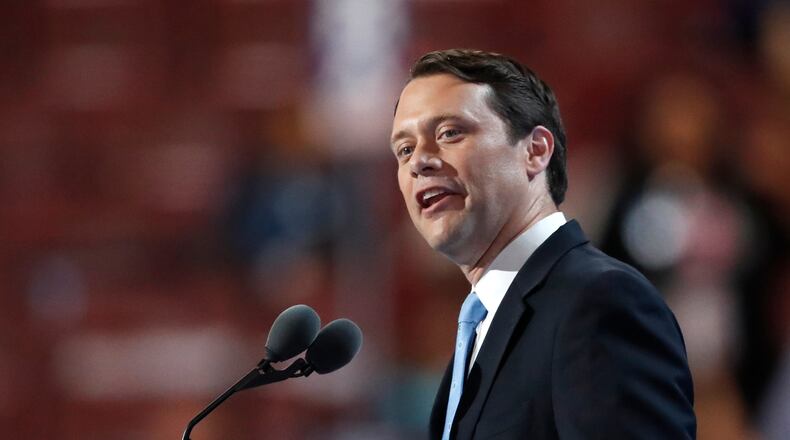Democrat Jason Carter said Wednesday he won't run for Georgia governor again in 2018, virtually ensuring the party's primary will be a contest between two high-profile female lawmakers aiming to flip the state next year.
Carter, a former state senator who was the party’s nominee in 2014, said he was focused on “prime dad time” for his two sons, who are 8 and 10. And he said he was charting out a future for the Atlanta-based Carter Center, the human rights group his grandfather founded and whose board he now chairs.
"It's not bittersweet. I'm excited as a Democrat and for Georgia. I'm excited as a Georgian over the fact that we're going to have an incredibly robust discourse," he said, emphasizing that the race for 6th District and Donald Trump's struggles in Atlanta's suburbs have energized Democrats.
“Georgia is firmly planted in the national discourse in a really compelling way. And I think that bodes well in the state and for the other Democrats running for governor.”
Carter, 41, did not rule out a run in the future, likely for statewide rather than federal office in future cycles. He also declined to endorse either of the Democratic candidates – House Minority Leader Stacey Abrams and state Rep. Stacey Evans – saying only he would be “very engaged” in the 2018 campaign.
“I am very impressed with both Staceys. Both of the candidates are top-flight candidates for our state. Both will make excellent governors,” said Carter. “The key for Democrats is to present a candidate who can bring the state together in effective ways - that can be a governor for the entire state. And both have that potential. Democrats should be excited about having a primary.”
Carter adopted a somewhat centrist message in his 2014 gubernatorial run, voting for a gun rights expansion while also criticizing Gov. Nathan Deal for his refusal to expand Medicaid. He raised millions of dollars to amplify his message with the help of his grandfather, former President Jimmy Carter.
Yet he still struggled to gain traction with white voters and lost to Deal by 8 points, igniting an internal debate in the party over how best to flip the state in 2018:
Do Democrats try to expand a coalition of younger, diverse voters by targeting left-leaning residents who may have skipped the 2014 vote? Or do they craft new policies to appeal to suburban residents, many of them moderate or conservative, turned off by Trump?
In the interview, Carter said there will be temptations to nationalize the race and try to turn it into a referendum on Trump, which could presumably help Democrats energize their base. But he urged the candidates not to leave any voter behind and aim to appeal with a broad-based message.
“Ultimately it’s a state race,” he said, “and those folks that are running as Democrats, or Republicans, have to understand they’re going to be a governor for the entire state of Georgia - and they shouldn’t leave any voter off of their list.”
Carter’s decision comes as little surprise, as he’s telegraphed little about a potential run in recent months. But he was the last remaining prominent Democrat to rule out a run, after Atlanta Mayor Kasim Reed and former acting U.S. Attorney General Sally Quillian Yates both said they won’t seek the office.
Democrats hope Trump’s struggles give them a tantalizing opening to succeed Deal, who is term-limited. Republicans are eager to keep a grip on an office they’ve held since 2002.
Three Republicans are already in the contest: Lt. Gov. Casey Cagle, Secretary of State Brian Kemp and state Sen. Hunter Hill. And several others, including state Sen. Michael Williams and GOP operative Nick Ayers, are considering a bid.
Carter, nursing a dislocated shoulder, said of the lessons he learned from his 2014 campaign one stuck out: He would urge both Abrams and Evans to “stay true to themselves” amid the attention and stress headed their way. As for his own future after 2018, Carter made clear he was not ruling out another run for public office.
“I’m going to stay engaged. I enjoy it. We’ll just have to look at what the future holds,” Carter said. “If there’s one thing that 2016 showed is if you think you know what’s going on, you’re probably wrong.”
Read more on MyAJC: How Trump is shaking up the governor’s race
About the Author
The Latest
Featured



